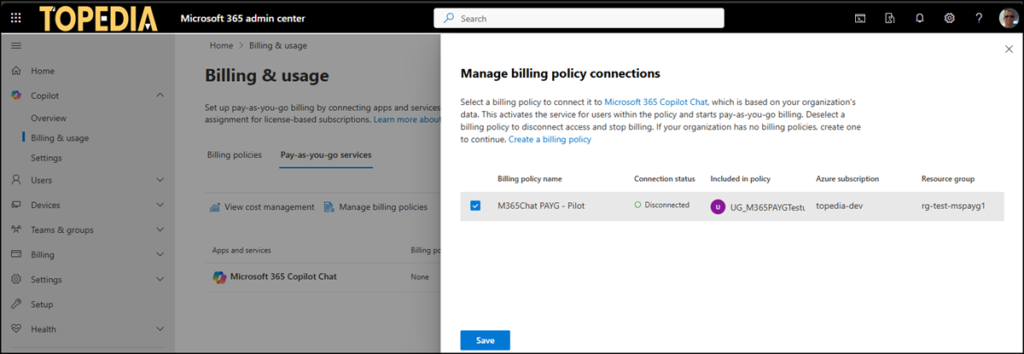Microsoft announced the rollout of billing policies for Copilot Pay-as-you-go services (PAYG) on Microsoft 365. This feature lets administrators connect agent usage to specific departments, control user group access, and streamline billing. With granular policies, organizations gain tighter cost control and transparent departmental accountability.
Content
Timeline
Billing policies should be available in May 2025.
How does this affect your organization?
Accounts with the Global admin role or Azure subscription owners (as noted by Microsoft, not the AI Administrator role) can now use M365 admin controls to configure Microsoft 365 PAYG billing policies.
Based on the Microsoft release information, admins should be able…
- Track and allocate usage and costs by department
- Enforce access controls for user groups tied to billing policies
- Improve governance and financial transparency
- Customize deployment of work-grounded declarative agents in M365 Copilot Chat
How to configure Microsoft 365 PAYG billing policies and your options?
As noted in the PAYG terms of service, your account must be a Global Admin or Azure subscription owner to configure PAYG billing policies in the M365 admin center.
Pay as you go billing is disabled by default. A global admin or owner to the subscription can enable or disable Microsoft 365 pay-as-you-go features in the Microsoft 365 admin center.
- If you have already configured PAYG for Copilot Chat, the system informs that an admin must disable the current PAYG configuration. This is not a big deal, as you have to configure this PAYG with the new billing policy again.

- Create a new policy and connect it to an Azure subscription. The Region field has a bug, you have to use your keyboard to select the correct region.
Be careful with the values; you cannot edit a policy after it is created, including changing its name or the assigned Entra ID groups. You have to delete and recreate the policy.

- Assign one or multiple Entra ID security groups to the policy. As mentioned before, you cannot change these groups later.

- Now you have to connect the policy to a service. Currently, there is just Microsoft 365 Copilot Chat. All users from the group(s) have access to metered usage costs from that service.
- You can connect one PAYG service to multiple billing policies.
- An Azure subscription can only be connected to one billing policy.

- That’s it. At this development stage, you have no more options, no settings to limit the billing or set maximum costs.
As Microsoft states in its documentation, updates should follow.
In the future, new features using pay-as-you-go billing are announced in a message center post. When the features become available, users in your organization can take advantage of those capabilities. Pay-as-you-go billing is disabled by default.
What has been changed for the users?
The current development state should allow admins to limit metered usage of Copilot Chat to defined users. Previously, you enabled Copilot Chat PAYG for all or nobody (like you still have to with SharePoint Agents in Syntex PAYG). I’m pretty sure Microsoft will also transfer the SharePoint Agent PAYG model to the new billing policy.
Admins and users should remember that the Copilot Chat PAYG policy applies only to metered usage for Copilot Studio agents or Microsoft pre-built agents (like the Coach agents), as described here. The new policy does not impact SharePoint agents, who are billed through Syntex PAYG.
- Policy members can use Copilot Studio agents and Microsoft pre-built agents if they access Microsoft 365 Copilot Chat at m365.cloud.microsoft/chat or in Teams via the Copilot app. They can also build Copilot Studio Builder agents with metered usage. Microsoft prepared a good table about agent capabilities. Check the column for Copilot Chat (metered usage).
- Non-policy members can use Copilot Studio agents and build Copilot Studio Builder agents with free sources if they access Microsoft 365 Copilot Chat at m365.cloud.microsoft/chat or in Teams via the Copilot app. Check the column for Copilot Chat (no metered usage).

